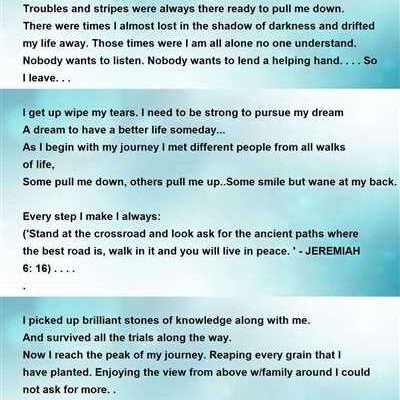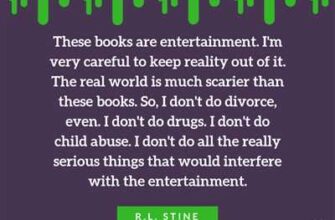
Writing about one’s journey in life can be a remarkable experience. It offers the opportunity for reflection, self-discovery, and growth. Whether you are an aspiring writer or simply someone who wants to document their life experiences, writing your journey can be a fulfilling and enlightening process. In this article, we will explore some tips and guidelines on how to write your journey.
First and foremost, it’s important to start with a good revision of your past. Take some time to reflect on your life experiences, both the highs and the lows. Think about the lessons you’ve learned, the challenges you’ve overcome, and the milestones you’ve achieved. This introspection will help you gain a deeper understanding of yourself and provide valuable material for your writing.
When writing about your journey, it’s essential to keep an eye on the future as well. Consider where you want to be in the years to come and what steps you need to take to get there. This forward-thinking approach will give your writing a sense of purpose and direction. It will also allow you to create a narrative arc that guides readers through your story.
Once you have a structure in mind, start writing your journey as if it were a published story. Include vivid descriptions of the places you’ve visited, the activities you’ve participated in, and the people you’ve met along the way. Like any good story, your journey should have a beginning, middle, and end. Use paragraphs to organize your thoughts and make the reading experience more enjoyable for your audience.
As you write, don’t be afraid to delve into the emotions and thoughts that surrounded your experiences. Share your joys, fears, and insights with your readers. This personal touch will make your writing more relatable and engaging. Remember, the best essays are often based on personal experiences and emotions.
Before you consider your writing complete, it’s important to give it a thorough revision. Check for grammar and spelling errors, ensure that your paragraphs flow smoothly, and make sure that your ideas are presented in a logical and coherent manner. If needed, ask a friend or family member to read your work and provide feedback. A fresh pair of eyes can often catch mistakes or suggest improvements that you may have overlooked.
In conclusion, writing your journey is an incredible opportunity to reflect on your past, envision your future, and share your experiences with others. It allows you to become both the author and the protagonist of your own story. So, grab a pen and a notebook, and start writing your journey today. Remember, a journey of a thousand miles begins with the first few paragraphs!
Essay 1 Revision
When I first started writing my journey essay, I thought it would be a straightforward task. However, as I began to put my thoughts on paper, it became clear that it would take a lot more work than I had anticipated. Writing about my own experiences and emotions was not as easy as it seemed.
One of the challenges I faced was the lack of photos to include in my essay. As someone who likes to document their activities and travels with pictures, it was hard to write about certain moments or places without any visual aids. However, I realized that words can also paint a vivid picture and decided to focus on descriptive language instead.
Another difficulty I encountered was grammar and writing style. I had never really paid much attention to the rules of grammar before, and now I understood the importance of proper punctuation and sentence structure. I spent a lot of time revising and editing my essay to ensure that it was well-written and free from errors.
As I revised my essay, I also realized that there were parts where I needed to provide more details or add more context. For example, when I mentioned that I visited a certain place, I realized that I should have included information about why I went there and what I did. I wanted my readers to be able to see and experience the journey through my words.
Furthermore, I had to make decisions about the tense and perspective in which I wanted to write my essay. Should I write in the past tense, as if everything had already happened? Or should I write in the present tense, as if the journey is still ongoing? I ultimately decided to mix both tenses, using the past tense for the events that had already taken place and the present tense to convey my current thoughts and reflections.
During the process of revision, I also sought feedback from others. I reached out to fellow writers and friends to read my essay and provide their input. It was helpful to get an outside perspective and hear what others thought about my writing. Their feedback allowed me to make improvements and consider different perspectives.
In the future, I will approach the writing process differently. I have learned that writing is not just about putting words on paper; it is an art form that requires time, effort, and dedication. I now understand that revisions are an essential part of the writing process and that a good essay is never truly finished.
Looking back on this journey of writing my essay, I realize that it was more challenging than I initially thought. However, I also appreciate the growth and development that has come from working through this process. Writing has become a part of my everyday life, and I have discovered that it is a way for me to express myself and connect with others.
As I continue to write, I will also continue to read. I have found that reading books and articles by other writers has greatly improved my own writing. Reading exposes me to different writing styles and techniques, and it has become a source of inspiration for my own work.
Overall, the process of revising my essay has taught me a valuable lesson about writing. It has shown me that writing is not just about the end result, but about the journey of crafting and refining words. It has made me appreciate the hard work and dedication that goes into being a writer. As Sharon Duggal once said, “Writing is a touchstone to understanding the world around us and ourselves within it.”
Write Write Write
Writing has always been a part of my life. I have always enjoyed putting my thoughts down on paper and expressing myself through words. As a child, I would spend hours writing stories and poems, imagining new worlds and characters. I also loved reading, and would often get lost in the words of my favorite authors.
When I started my journey as a writer, it was not easy. Writing essays and articles can be hard, especially when you have to do it every day. But I knew that if I wanted to become a published writer, I had to write. So, I made it a habit to write something every day, even if it was just a few paragraphs.
There were times when I struggled with what to write. I would sit at my desk, staring at a blank page, and feel a lack of inspiration. But I knew that I had to push through and write anyway. I bought books on writing and read articles online to find sources of inspiration. I also visited writing workshops and listened to other writers talk about their journey.
Reading and researching became a part of my daily activities. I realized that to become a better writer, I needed to not only write, but also read and learn from other writers. I studied grammar and punctuation, and worked on revising my own writing. I heard Sharon Duggal once say, “Write like you’re not afraid. Write like you’re able. Write like you’ve never written before.” Her words stuck with me and became my mantra.
Writing is a journey that never ends. Every day, I discover new things about myself and my writing style. I learn from my mistakes and try new techniques. Writing allows me to touch the lives of others, to share my thoughts and emotions, and to connect with people all over the world.
Writing has also become a way for me to document my own journey. I keep a journal where I write about my experiences, thoughts, and dreams. I include photos and mementos to help me remember the places I have visited and the people I have met. My journal is a reflection of who I am and where I have been.
Writing takes me to places I have never been before. It allows me to explore new ideas and imagine different futures. It helps me make sense of my thoughts and feelings, and gives me a sense of purpose. Writing has become a part of me, something that I can’t imagine my life without.
| Writing Tips | Reading Tips |
|---|---|
| – Write every day | – Read every day |
| – Don’t be afraid to make mistakes | – Explore different genres |
| – Revise your work | – Take notes while reading |
| – Find sources of inspiration | – Discuss books with others |
| – Write with passion | – Don’t be afraid to try new authors |
My Journey as a Writer by Sharon Duggal

When I first thought about becoming a writer, I never thought it would become a full-time job for me. Writing was just something I enjoyed doing in my free time, a way to focus my thoughts and express myself. In the beginning, I mostly wrote essays and short paragraphs about my everyday activities.
As time went on, I realized that writing was more than just a hobby. I started reading books by other writers and visiting different websites to learn more about the craft. I bought books on grammar and revision, and I practiced writing in different styles and genres.
It was hard at times, especially when I would receive criticism or rejection from publishers. But I never gave up. I kept working on my writing skills and seeking advice from other writers. Their guidance and support encouraged me to keep going.
Then, one day, something changed. I got published. It was a short story that I had submitted to a literary magazine, and they accepted it. I couldn’t believe it! That moment gave me the confidence to continue pursuing my dream of becoming a writer.
Since then, I have written numerous articles, short stories, and even a novel. My journey as a writer has been filled with ups and downs, but I wouldn’t trade it for anything. Writing has become an essential part of my life, and I can’t imagine my days without it.
Every morning, I sit down with a cup of coffee and my laptop, ready to dive into the world of words. Sometimes, the words flow effortlessly, and other times, they need to be coaxed out. But no matter what, I keep writing.
My writing is often based on the lives of people I have met, places I have visited, and experiences I have had. I draw inspiration from the world around me and try to capture the essence of what it means to be human.
It takes discipline and dedication to be a writer. There are times when I struggle with writer’s block or doubt my abilities. But I have learned to push through those moments and keep writing. Writing is a journey, and I am still learning and growing with each new piece I create.
So, if you want to become a writer, don’t let anything hold you back. Start writing, even if you think your writing is not good enough. The more you practice, the better you will become.
And remember, becoming a writer is not just about the destination, but also about the journey. Enjoy the process, embrace the challenges, and never stop learning.
Sources
When I first started working on my journey as a writer, I found it helpful to read essays and articles written by other writers. There were many sources where I could find such content. Books were a great resource, as they not only provided guidance on how to write, but also gave me insight into the thoughts and experiences of established writers. Sharon Duggal’s “The Handsworth Times” and “The Henna Artist” by Alka Joshi were some of the books I bought and read.
I also visited websites and online platforms where writers shared their work and thoughts. Reading articles and essays on platforms like Medium and Writer’s Digest gave me a broader understanding of the writing process. I heard about different writing activities and tips from experienced writers, which helped me in my own writing journey.
Reading and writing activities were not the only sources I relied on. Sometimes, I would also watch interviews or listen to podcasts where writers talked about their craft. By doing so, I could hear firsthand the experiences and thoughts of successful authors.
As I progressed in my journey, I realized the importance of not just consuming content, but also actively working on my own writing skills. I started revising my own work and seeking feedback from others. This hands-on approach helped me touch base with my own writing style and grammar skills.
Throughout my journey, I found that it’s not just about reading or writing; it’s about finding a balance between the two. There were times when I would read a lot to gain inspiration, and then there were times when I would focus solely on writing without any external input.
Now, as a more experienced writer, I understand that the journey of writing never ends. It takes continuous effort and practice to improve. I have learned to incorporate what I’ve discovered from my sources into my everyday life as a writer, making it a part of who I am and what I create.
While there are many sources for writers, the most important aspect is to have the drive and passion to keep writing, regardless of any obstacles that may come along the way. Writing has never been easy, but the satisfaction that comes from seeing your work published or based on full of your own thoughts is worth all the hard work.
The lack of confidence or the fear of not being good enough should never stop anyone from pursuing their writing journey. It’s important to remember that even the most successful writers were once just starting out, and they faced challenges and moments of doubt as well.
So, if you have a passion for writing or have always thought about becoming a writer, don’t let anything hold you back. Start your own journey, and who knows, maybe one day, your words will inspire others just like the writers who have inspired you.
Remember, writing is not just about the destination; it’s about the journey, and it’s a journey where you are the writer and the protagonist.









